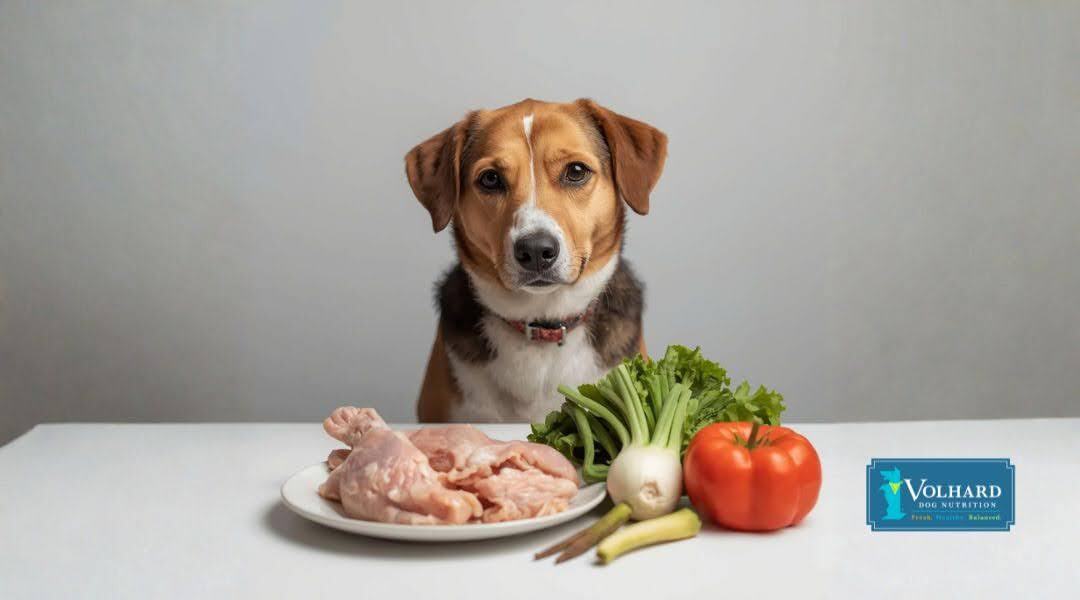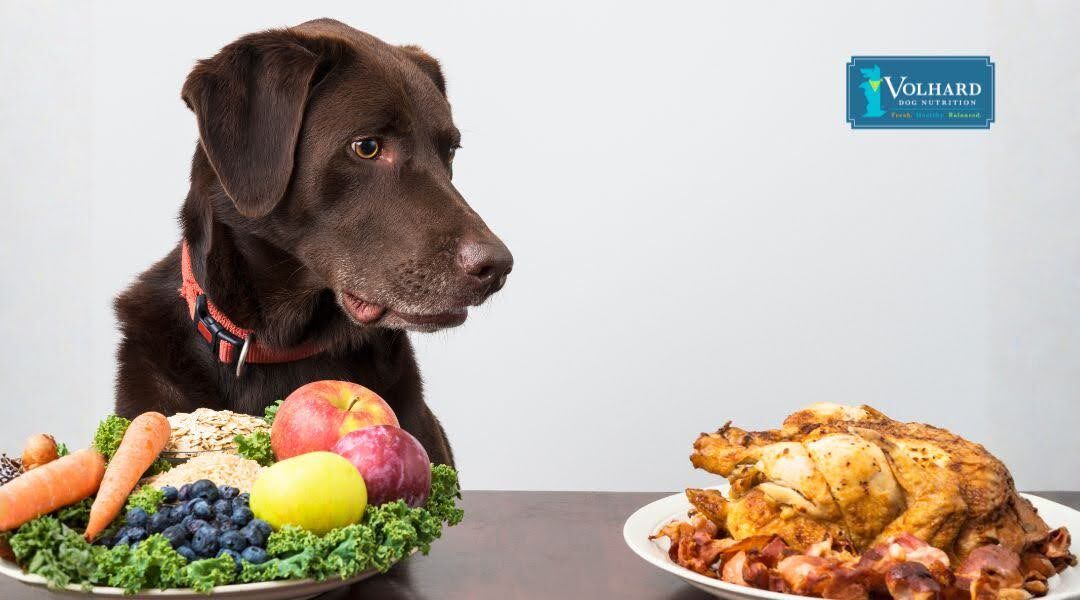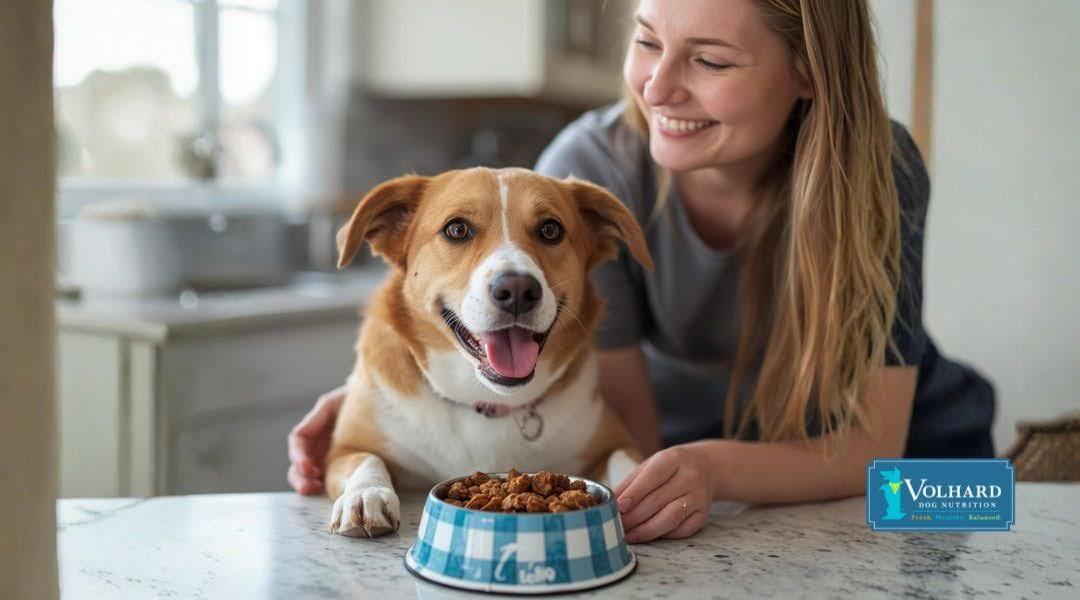Sensitive Stomach Diet for Dogs: The Best Foods, Treats, and Remedies for Digestive Relief
Posted by Volhard Dog Nutrition on Nov 25th 2025
Just like humans, some dogs have sensitive stomachs, making mealtime a little tricky. Excessive gas, loose stools, occasional vomiting, or loss of appetite can all be signs that your dog’s digestive system is struggling to handle their current diet.
The good news? With the right nutrition and feeding approach, you can help your pup find lasting digestive comfort.
Whether your dog’s tummy troubles are caused by food intolerances, stress, or an underlying health condition, we will help you understand what to look for in a diet and what to avoid to restore happy, healthy digestion.
What Causes a Dog’s Sensitive Stomach?
A sensitive stomach can develop for a variety of reasons; common causes include food intolerances or allergies. Often triggered by specific proteins, grains, or artificial additives.
Sudden diet changes, eating table scraps, or consuming spoiled food can also disrupt your dog’s digestive balance. In some cases, gastrointestinal infections, parasites, or chronic conditions like inflammatory bowel disease (IBD) may be to blame.
Even stress, anxiety, or eating too quickly can contribute to recurring tummy troubles. Understanding the root cause is the first step toward choosing the proper diet and restoring your dog’s digestive comfort.
Signs Your Dog Has Digestive Issues or Food Sensitivities
Dogs with sensitive stomachs often show subtle (and sometimes not-so-subtle) signs of discomfort. Watch for symptoms such as:
- Frequent vomiting
- Diarrhea
- Excessive gas
- Bloating
- Constipation
Some dogs may lose interest in food, experience weight loss, or have a dull, flaky coat due to poor nutrient absorption. Itchy skin, ear infections, or chronic paw licking can also point to food sensitivities or allergies.
When to See a Vet About an Ongoing Upset Stomach
While mild digestive upset can sometimes resolve with a bland diet or short fasting period, persistent symptoms should never be ignored.
Contact your holistic veterinarian if your dog’s vomiting or diarrhea lasts more than 24–48 hours, if you notice blood in the stool, or if your dog becomes lethargic or dehydrated.
Chronic digestive problems can indicate more serious conditions such as pancreatitis, IBD, or liver disease.
A vet can perform diagnostic tests, rule out infections or parasites, and recommend a tailored diet or medical treatment plan to get your dog’s digestion back on track safely.

The Foundation of a Sensitive Stomach Diet for Dogs
At Volhard Dog Nutrition, we believe that the key to soothing a sensitive stomach starts with feeding your dog using whole, fresh, and easily digestible ingredients.
Our balanced diets are formulated to support optimal digestion from the inside out, combining lean proteins, gentle carbohydrates, and essential fats with natural enzymes and probiotics.
By focusing on clean, species-appropriate nutrition rather than heavily processed kibble, we help your dog’s digestive system function the way it’s meant to.
Why Diet Matters for Digestive Health
Your dog’s digestive health is often a reflection of what goes into their bowl every day. A high-quality, biologically appropriate diet not only fuels your dog’s body but also nourishes the beneficial bacteria in their gut, which play a crucial role in immune defense and nutrient absorption.
Volhard diets are crafted to maintain the ideal pH balance in the stomach and intestines, ensuring smooth digestion and minimal irritation. When your dog eats a diet that aligns with their natural physiology, rich in real meat, fresh produce, and balanced micronutrients, you’ll notice the difference in their energy, stool quality, and overall vitality.
Common Ingredients That Trigger Dog Stomach Upsets
Many commercial dog foods contain ingredients that are tough on sensitive stomachs. Fillers like corn, soy, and wheat can cause inflammation and are difficult for dogs to digest. Artificial preservatives, colors, and flavorings can further irritate the gut lining and disrupt the microbiome. Even certain protein sources, like chicken or beef by-products, may trigger sensitivities in some dogs. At Volhard, we eliminate these common culprits, using only human-grade ingredients and single-source proteins, making it easier to identify and avoid potential irritants while supporting long-term gut health.
Key Nutrients That Support Gut Balance
A thriving gut depends on more than just what’s not in your dog’s food—it’s also about what is. Volhard diets are enriched with prebiotics, probiotics, and digestive enzymes to foster a balanced microbiome. Omega-3 fatty acids from natural sources like fish oil reduce intestinal inflammation, while soluble fibers from vegetables and whole grains support healthy stool formation. We also emphasize vitamins and minerals that aid tissue repair and immune defense, ensuring your dog’s digestive tract stays strong, resilient, and capable of handling life’s occasional dietary challenges.

Best Dog Food for Sensitive Stomachs
Recent studies involving 7,015 dogs revealed that when puppies were fed non-processed meat-based diets during early life, they were less likely to develop IBD as adult dogs.
When it comes to feeding dogs with sensitive stomachs, simplicity, purity, and digestibility are key. Volhard's Rescue Diet was designed exactly for this purpose, to give dogs the relief they need without sacrificing complete, balanced nutrition.
This minimally processed dehydrated base mix is grain-free and gluten-free, making it an ideal foundation for dogs with gastrointestinal (GI) sensitivities, food intolerances, or allergies. Pet parents simply add the protein of their choice, raw or cooked, to the base mix, allowing full control, easy rotation, and peace of mind, knowing all nutrient requirements are being met. Every ingredient in the Rescue Diet is selected to nourish the liver, kidneys, heart, lungs, stomach, and digestive tract while maintaining low glycemic impact and supporting recovery from illness or injury.
What to Look for in High-Quality Dog Food
Choosing the right diet for a sensitive dog starts with recognizing what quality really means. A high-quality food should feature whole, high-quality ingredients, minimal processing, and a transparent ingredient list free of fillers and preservatives. Volhard's single-step cold dehydration process ensures that essential vitamins, minerals, and enzymes remain intact, preserving the integrity of the food as nature intended. Formulated under the guidance of a Board-Certified Veterinary Nutritionist, the Rescue Diet exceeds AAFCO nutritional levels for adult dogs and can even be fed to puppies, including large breeds. When evaluating any dog food, look for signs of quality you can see and smell — like the fresh aroma and vibrant colors that come from truly whole foods.

Dog Treats for Sensitive Stomachs
Even dogs with delicate digestion deserve delicious rewards, and Volhard’s 100% Freeze-Dried Pork Liver Dog Treats make it easy to train and treat without worry. Made from single ingredient, ethically sourced, raw pork liver, these nutrient-rich, sugar-free, grain-free, and gluten-free treats are gentle on the stomach and packed with flavor. Because they’re freeze-dried rather than cooked or processed, every bite retains its natural aroma, taste, and nutritional value. Trainers and pet parents alike have trusted these liver treats for over 40 years to keep dogs motivated, focused, and happy.
Choosing Low-Fat, Easily Digestible Treats
For dogs prone to digestive issues, not all treats are created equal. The best options are low in fat, high in natural protein, and free of artificial flavorings or preservatives. Volhard’s freeze-dried liver treats fit the bill perfectly, rich in bioavailable nutrients like vitamin A, iron, zinc, and omega-3 and -6 fatty acids, yet light and easy to digest. Because they’re made in small batches from American-farmed pork and contain no additives, these treats deliver clean, consistent nutrition that supports a healthy gut and shiny coat. Plus, their irresistible aroma makes them an ideal high-value training reward or a tasty topper for picky eaters.
Ingredients to Avoid in Commercial Treats
Many commercial treats can sabotage your efforts to soothe your dog’s stomach. Look out for artificial preservatives (like BHA and BHT), chemical colorings, added sugars, and fillers such as corn, soy, or wheat. These ingredients can trigger inflammation, allergic reactions, or digestive upset. Multi-ingredient treats that rely on by-products or flavor enhancers can also make sensitive stomachs worse. That’s why Volhard takes a single-ingredient, whole-food approach, offering treats that are as close to nature as possible, with nothing extra your dog doesn’t need. By avoiding harmful additives and focusing on purity, Volhard helps you treat your dog’s stomach with the same care you give their overall health.

Transitioning to a New Sensitive Stomach Diet
Switching your dog to a new diet, especially one designed for sensitive stomachs, should always be a gradual process. Sudden changes in food can shock the digestive system and undo the benefits of a gentle, balanced formula like Volhard’s Rescue Diet. To set your dog up for success, introduce the new food slowly over 7–10 days, mixing a small portion of the Rescue base mix and your chosen protein with your dog’s current food.
Gradually increase the amount of the new diet each day while decreasing the old food until your dog is fully transitioned. This method gives their digestive tract time to adjust to new nutrients, enzymes, and textures while minimizing the risk of diarrhea, bloating, or loss of appetite.
How to Switch Dog Food Without Upsetting the Stomach

For dogs with delicate digestion, slow and steady is the golden rule. Start by adding 25% Rescue to 75% of the old food for the first day, then progress to a 50/50 mix on day four. Move to 75% Rescue and 25% old before completing the switch entirely. During this time, avoid introducing new treats or supplements—keep the focus on helping your dog’s body adapt. Because Volhard's Rescue Diet uses gentle, human-grade, and anti-inflammatory ingredients, most dogs transition smoothly. Still, patience pays off: the more gradual the switch, the easier it is for your dog's system to find balance and thrive.
In extremely sensitive dogs, it can be beneficial to keep Gut Soothe on hand during the transition. Gut Soothe is made from herbal components like slippery elm bark and marshmallow root that target inflammation and help to soothe the mucosal lining to reduce loose stool.
Monitoring Improvements in Stool, Energy, and Appetite
Once your dog has fully transitioned, observe how their body responds. The first signs of digestive harmony often appear in the quality of their stool, it should become more consistent, well-formed, and easier to pass. You may also notice increased energy levels, brighter eyes, and renewed enthusiasm for mealtime. Improvements in skin, coat, and even breath can follow as the gut microbiome stabilizes. Keep an eye on appetite, hydration, and overall demeanor; these subtle indicators reveal whether your dog's body is truly benefiting from the diet. With Volhard's Rescue Diet, many pet parents see visible improvements within weeks, confirming that real, whole-food nutrition makes all the difference for sensitive stomachs.

Help Your Dog Feel Their Best with Volhard Nutrition
For more advice on dog nutrition, health, and training, contact us and check out our other blogs!
Volhard Dog Nutrition and its expert canine nutrition coaches offer online consultations to help more dog parents discover why and how to feed their dogs the healthiest foods!
Speaking to a Volhard canine nutrition coach can help you understand the inseparable relationship between healthy food, a healthy body, and a healthy mind.
If you want to contact one of our Volhard canine nutrition coaches, don't hesitate to send us a message through our LiveChat feature or schedule a personalized consultation!
Reference List:
Burke, Anna. “Best Dog Food for Sensitive Stomachs.” American Kennel Club, 28 Oct. 2025, https://www.akc.org/expert-advice/nutrition/best-dog-food-sensitive-stomachs/.
Cope, Dr Mary, PhD. “Dog Food for Sensitive Stomachs.” Whole Dog Journal, 29 July 2024, updated 24 Sept. 2025, https://www.whole-dog-journal.com/food/dog-food-for-sensitive-stomachs/.
Morrison, Barri J., DVM. “How a Bland Diet for Dogs Helps With Stomach Upset.” PetMD, updated 18 Nov. 2024, https://www.petmd.com/dog/nutrition/bland-diet-for-dogs/.
Hemida, Manal, et al. “Early Life Modifiable Exposures and Their Association With Owner Reported Inflammatory Bowel Disease Symptoms in Adult Dogs.” Frontiers in Veterinary Science, vol. 8, 1 Feb. 2021, article 552350, doi:10.3389/fvets.2021.552350.
Pilla, Rachel, and Jan S. Suchodolski. “The Role of the Canine Gut Microbiome and Metabolome in Health and Gastrointestinal Disease.” Frontiers in Veterinary Science, vol. 6, 14 Jan. 2020, article 498, doi:10.3389/fvets.2019.00498.


